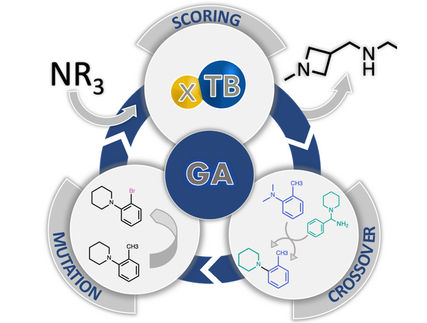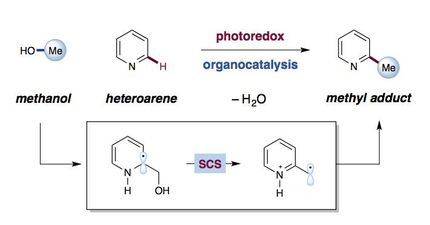Halogen bridges as catalysts
New catalyst class uses halogen bridges for environmentally friendlier production
catalysts are essential for the chemical industry because they accelerate reactions and increase their yields. However, many of the catalysts in use today are based on expensive and environmentally harmful metals. Stefan Huber and Florian Kniep from the Chair of Organic Chemistry at the Technische Universitaet Muenchen (TUM) have now presented an alternative: non-toxic compounds, so-called halogen bridge donors, can serve as organic catalysts. Evonik Industries AG awarded Florian Kniep their research prize for his work.
Ninety percent of all chemical products require catalysts in the course of their manufacture. They accelerate reactions and reduce the energy needed. Catalysts participate in reactions, but are not consumed. As a result one catalyst molecule can convert millions of substrate molecules, which explains the great economic value of catalysts. Unfortunately, catalysts for organic reactions – for example, in plastics manufacturing – are often based on expensive and toxic heavy or transition metal compounds. Organic nonmetal catalysts pose a good alternative here.
Many such organocatalysts have so far been based on the Lewis acid/base principle: Strong positively polarized hydrogen atoms, so-called Lewis acids, interact via weak hydrogen bridge compounds with negatively polarized substrates, so-called Lewis bases.
Now a team of scientists headed by Stefan Huber, research group head at the Institute of Organic Chemistry at the Technische Universitaet Muenchen (TUM) and Florian Kniep, a doctoral candidate at the Institute of Organic Chemistry, is introducing a new type of organocatalyst: A so-called halogen bridge donor, which bonds to the substrate via a halogen atom, for instance an iodine atom.
The presence of one or more iodine atoms gives the halogen bridge-based catalyst special properties that open up new avenues for application. According to a well-known chemical rule, so-called hard Lewis acids, which display low polarizability, interact best with similarly hard Lewis bases. This is the case for hydrogen bridge-based catalysts.
It works exactly the same the other way around: easily polarizable soft Lewis acids react best with soft Lewis bases. The new halogen bridge donors are precisely such soft Lewis acids, which makes them excellent catalysts for soft Lewis base substrates – an area that hydrogen bridge donors barely covered until now.
“In the long run we expect that halogen bridge-based organocatalysts and hydrogen bridge donors will complement each other,” says Florian Kniep. “Besides, halogen bridges could prove to be useful for future enantioselective applications, where only one of two possible molecules is formed.”
End of July Florian Kniep was awarded the research prize of Evonik Industries AG for his excellent work in the field of organocatalysis.
Original publication
Florian Kniep, Stefan H. Jungbauer, Qi Zhang, Sebastian M. Walter, Severin Schindler, Ingo Schnapperelle, Eberhardt Herdtweck und Stefan M. Huber; "Organokatalyse mit neutralen mehrzähnigen Halogenbrückendonoren."; Angewandte Chemie 2013, 125, 7166-7170
Sebastian M. Walter, Florian Kniep, Eberhart Herdtweck und Stefan M. Huber: "Halogenbrücken-induzierte Aktivierung einer Kohlenstoff-Heteroatom-Bindung."; Angewandte Chemie 2011, 123, 7325-7329.
Most read news
Original publication
Florian Kniep, Stefan H. Jungbauer, Qi Zhang, Sebastian M. Walter, Severin Schindler, Ingo Schnapperelle, Eberhardt Herdtweck und Stefan M. Huber; "Organokatalyse mit neutralen mehrzähnigen Halogenbrückendonoren."; Angewandte Chemie 2013, 125, 7166-7170
Sebastian M. Walter, Florian Kniep, Eberhart Herdtweck und Stefan M. Huber: "Halogenbrücken-induzierte Aktivierung einer Kohlenstoff-Heteroatom-Bindung."; Angewandte Chemie 2011, 123, 7325-7329.
Organizations
Other news from the department science

Get the chemical industry in your inbox
By submitting this form you agree that LUMITOS AG will send you the newsletter(s) selected above by email. Your data will not be passed on to third parties. Your data will be stored and processed in accordance with our data protection regulations. LUMITOS may contact you by email for the purpose of advertising or market and opinion surveys. You can revoke your consent at any time without giving reasons to LUMITOS AG, Ernst-Augustin-Str. 2, 12489 Berlin, Germany or by e-mail at revoke@lumitos.com with effect for the future. In addition, each email contains a link to unsubscribe from the corresponding newsletter.




















































